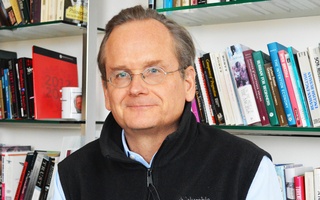Acclaimed cyberlaw expert Lawrence Lessig will return to Cambridge next summer, extending Harvard Law School’s recent streak of poaching top-flight professors from rival schools.
Lessig will re-assume a professorship at the Law School after nine years at Stanford, where he said he moved in 2000 to be closer to his wife, a native of California. In addition to being a law professor, Lessig will direct the Edmond J. Safra Foundation Center for Ethics.
Calling Lessig “one of the most brilliant and important legal scholars of our time,” Law School Dean Elena Kagan said in a statement that his work on Internet law has broken fresh ground and that she expects his more recent research—which is on government and political corruption—to be equally visionary.
“I am thrilled that he is returning to Harvard Law School and assuming the directorship of the [Safra] Center to advance those efforts,” she said.
Kagan has aggressively pursued the lateral hiring market during her tenure, snagging 20 tenured professors since her deanship began in 2003, compared to 18 in the preceding two decades. Last year alone, the Law School landed six tenured professors, including then-University of Chicago professor Cass R. Sunstein ’75, the most-cited American law professor.
Lessig, who was once a researcher at Harvard’s Berkman Center for Internet and Society, said that his primary motivation for coming back to Harvard was the opportunity to research corruption and ethics as director of the Safra Center.
“For the next five years we’re going to be doing a major research project...on the improper influence of money in a whole bunch of contexts—medical research, academic research, government, and politics,” Lessig said in an interview Friday. “It’s a chance to do something that I wasn’t able to do anywhere else in the world.”
Throughout the first part of his scholarly career—which included stints at Chicago, Harvard, and Stanford—Lessig focused on legal issues associated with the Internet and copyright law. He gained a strong following for taking a case to the Supreme Court in 2003 that challenged the constitutionality of current U.S. copyright law.
In 2007, Lessig announced that he hoped to take his work in a new direction by focusing on political corruption.
Although the offer of a professorship had been made over a year ago, according to Law School professor Richard H. Fallon, a member of the hiring committee, the Safra Center’s directorship was only offered this fall.
While Lessig said he was excited to return to a grayer, chillier part of the country, he also said his family made the decision to move despite their attachment to the Bay Area.
“My wife is sad to leave San Francisco because her whole life is out there, so you know that’s still difficult,” he said. “But I think we both realized that it was an enormous opportunity, and I just wasn’t in a position to shut it down.”
And, for the time being, the change in climate may even be a pleasant novelty.
“It’s colder here, but my kids are excited to see snow,” Lessig said. “They’ve never seen snow.”
—Staff writer Athena Y. Jiang can be reached at ajiang@fas.harvard.edu.
Read more in News
Grant Foundation Hit in Madoff SchemeRecommended Articles
-
Varsity Lacrosse Practice To Commence Late This SeasonDue to the organization of intra-mural lacrosse this year, Varsity practice will not start until later in the year than
-
Lessig Considers Run for CongressLawrence Lessig, the Stanford legal scholar known for his work in cyber and copyright law, said Tuesday that he was
-
Former Law School Professor Lessig Says He Won’t Run For Congressman in San Francisco-area DistrictCalling the response to his potential candidacy “simply humbling and inspiring,” former Harvard law professor Lawrence Lessig announced yesterday that
-
 Law School’s Lessig Considers White House Bid
Law School’s Lessig Considers White House Bid -
 Fundraising Goal Reached, Lessig Says He Will Run for President
Fundraising Goal Reached, Lessig Says He Will Run for President













